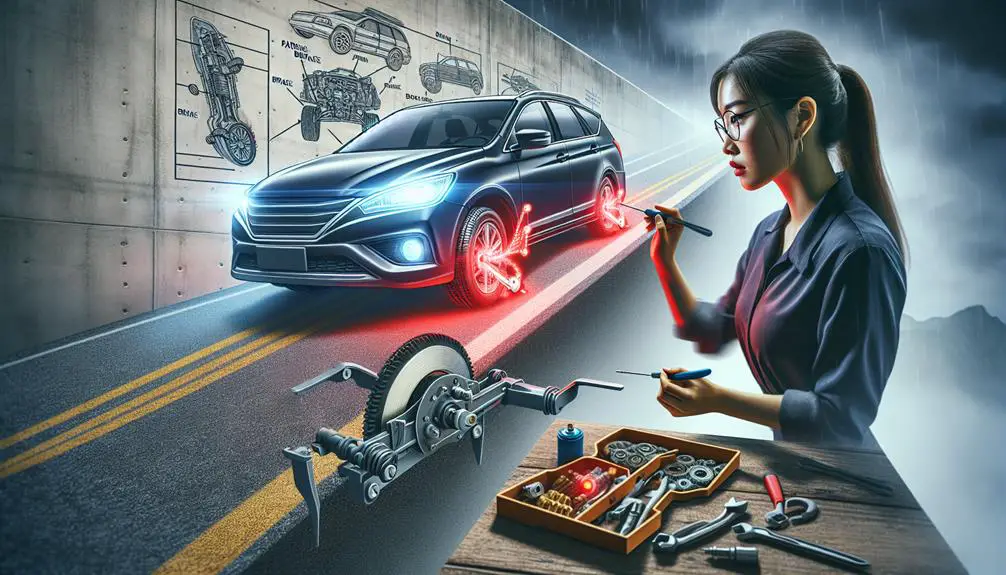- Your car's brake light may stay on if the handbrake is engaged.
- It could also indicate low brake fluid levels.
- Faulty sensors, worn brake pads, or electrical issues could also be the cause.
Engaged Handbrake Issues

Many drivers don't realize that an engaged handbrake can trigger the car's brake lights to remain on, often leading to confusion and potential battery drain. You might think you've done everything right, shutting off your car and ensuring all lights are turned off. Yet, if your handbrake is even slightly engaged, it can keep the brake lights illuminated. This not only confuses other drivers, thinking you're still operating the vehicle, but it additionally saps your battery, potentially leaving you stranded.
You're probably wondering how such a simple oversight can lead to these issues. Well, your car's design is such that the handbrake, when engaged, activates the brake light circuit as a safety feature. It's meant to alert others that your car is stopped on purpose, especially on inclines. However, if you forget to fully disengage the handbrake before leaving the car, those brake lights won't know the difference, staying lit and drawing power.
To avoid this, always double-check that your handbrake is fully released before stepping out of the car. Feel for the handbrake lever or pedal to be completely down or in its resting position. If your car has an electronic handbrake, make sure the indicator light confirms it's disengaged.
Taking these simple steps not only prevents unnecessary battery drain but prevents the risk of brake wear and the confusing signal it sends to other drivers. Remember, a little attentiveness goes a long way in preventing these easily avoidable issues.
Low Brake Fluid Levels
You might not be aware, but low brake fluid levels can greatly impact your car's braking performance. It's not just about the annoying light on your dashboard; it's a serious safety concern that you shouldn't ignore. When your brake fluid is low, your car's ability to stop effectively is compromised. This can happen due to a leak in the brake system or simply since the fluid has never been topped off or replaced.
To understand why this is important, let's explore what brake fluid does. It's the lifeblood of your brake system, transferring the force from your foot on the pedal to the brakes on the wheels. Without enough fluid, this system can't work as intended.
Here's a quick guide to help you check and address low brake fluid levels:
| Step | Action |
|---|---|
| 1. Check brake fluid level | Open the hood and locate the brake fluid reservoir. Check the level against the markings. |
| 2. Inspect for leaks | Look around the brake lines and at the back of the wheels for any signs of fluid leaks. |
| 3. Top off if necessary | If the level is below the 'MIN' mark, carefully add the correct type of brake fluid until it reaches 'MAX'. |
| 4. Monitor brake light | After topping off, start your car and see if the brake light turns off. |
| 5. Seek professional help | If the light stays on or you notice leaks, it's time to get your car checked by a professional. |
Faulty Brake System Sensors

While low brake fluid levels are a common issue, a faulty brake system sensor can also trigger your car's brake light and affect braking performance. Modern vehicles rely heavily on a network of sensors to maintain safety and efficiency. These sensors, particularly those within your car's braking system, play a vital role. However, when they fail, they can cause more than just an illuminated brake light on your dashboard; they can also greatly impact your driving experience and safety.
Here are four reasons why a faulty brake system sensor should concern you:
- Unexpected Brake Behavior: You might notice your brakes responding differently, either being too sensitive or not responsive enough. This unpredictability can be unsettling, especially in traffic or during inclement weather.
- Compromised Safety Features: Many cars come equipped with advanced safety features like ABS (Anti-lock Braking System) and ESC (Electronic Stability Control), which rely on accurate sensor data to function correctly. A malfunctioning sensor can disable these critical safety systems, leaving you more vulnerable in emergency situations.
- Increased Repair Costs: Ignoring a faulty sensor can lead to further damage, not just within the braking system but potentially affecting other car components. Early detection and repair can save you a great amount in the long run.
- Stress and Anxiety: Knowing something could be wrong with your car's braking system can lead to increased stress and anxiety while driving. The constant worry of potential brake failure can make driving an unpleasant experience.
Addressing a faulty brake system sensor promptly not only ensures your safety but also contributes to a smoother and more reliable driving experience. Don't ignore that brake light!
Worn Brake Pads Indicators
Recognizing the signs of worn brake pads is significant for maintaining your vehicle's safety and performance. When your car's brake pads wear down, they can trigger the brake light on your dashboard to stay illuminated. This is a vital message that you shouldn't ignore, as it's essential for both your safety and the integrity of your braking system.
One clear indicator of worn brake pads is a squealing or screeching noise when you apply the brakes. This sound is typically caused by a small metal shim, known as an indicator, which is designed to give you an audible warning that your brake pads need attention. If you're hearing these sounds, it's time to check your brake pads before they deteriorate further.
Another sign you might notice is a decrease in braking performance. If your car takes longer than usual to stop, or if the pedal feels softer or sinks lower than normal, it's likely that your brake pads are wearing out. These symptoms can lead to increased stopping distances and potentially dangerous driving conditions.
Moreover, you might feel a vibration in the brake pedal when you apply the brakes. This can indicate that the brake pads are unevenly worn or that the brake rotors are warped. Either condition suggests that your brake pads need inspection and possibly replacement.
Overlooking these indicators can lead to more serious issues, including damage to other components of your brake system. So, if your brake light stays on and you're experiencing any of these symptoms, it's essential to have your brake pads checked and replaced if necessary.
Electrical System Malfunctions

Another reason your brake light might stay illuminated is because of electrical system malfunctions in your vehicle. This can range from simple issues like a blown fuse to more complex problems such as a faulty wiring harness. When the electrical pathways that connect your brake lights to the brake system get disrupted, it throws everything off balance. It's not just an annoyance; it's a signal that something deeper might be wrong.
- Frustration with Unpredictable Issues: One day your car seems fine, and the next, you're stuck with a brake light that won't turn off. It's like playing a guessing game with your car's intentions, and honestly, you never signed up for this.
- Anxiety Over Safety: Knowing that your brake light could be indicating a serious electrical issue puts you on edge. You're constantly wondering if your brakes will perform correctly when you need them most, or if other critical systems might be affected.
- Irritation from Unexpected Expenses: Electrical problems can be like opening a can of worms. What starts as a simple brake light issue can quickly escalate into a costly repair job, draining your wallet and your patience.
- Disappointment in Vehicle Reliability: You rely on your car for so much, and to have it falter in something as basic as signaling when you're braking shakes your confidence in its dependability.
Electrical system malfunctions aren't just vital issues; they're disruptions to your daily life and peace of mind. It's essential to address them promptly, not just for the sake of turning off that persistent brake light, but for the overall health and safety of your vehicle.
Conclusion
If your car's brake light stays on, it's crucial to address it promptly.
You might've left the handbrake engaged, or you're running low on brake fluid.
Sometimes, it's because of faulty brake system sensors or worn brake pads.
Don't overlook potential electrical system malfunctions either.
Each of these issues can compromise your safety on the road.
So, it's best to get it checked out by a professional to make sure you're driving safely.